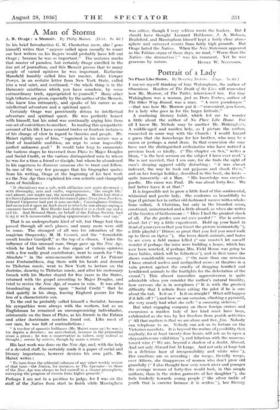A Man of Storms
himself) writes that " anyone called upon casually to count our best writers on his fingers' would probably have left out Osage ; because he was so important." The sentence marks that master of paradox, but certainly Orage excelled in the fine art of journalism, and this Memoir proves that to many people of varied opinions he was important. Katherine Mansfield humbly called him her master. John Cowper Powys, in an ecstatic letter from New York State, called him a real saint, and continued, " the whole thing is in the Daimonic saintliness which you have somehow, by some extraordinary trick, appropriated to yourself." Many other high tributes are given, especially by the author of the Memoir, who knew him intimately, and speaks of his career as an intellectual adventure and a spiritual quest.
Certainly Orage was persistently driven to intellectual adventure and spiritual quest. He was perfectly honest
with himself, but his mind, was continually urging him from one set of convictions to another. In reading this sympathetic account of his life I have counted twelve or fourteen instances
of his change of view in regard to theories and people. Mr. Mairet rightly says of him, ingrained in his nature was a kind of insatiable ambition, an urge to some imposSibly perfect unknown goal." It would take long to enumerate the various stages he traversed from Plato to Major Douglas and Social Credit, or the various distinguished men to whom he was for a time a friend or disciple, but whom he abandoned in his eagerness to discover someone else to trust and follow. In one of the very few passages that his biographer quotes from his writing, Orage at the beginning of his best work
oa the New Age thus explained his own eclectic and changeful form of Socialism : " It (Socialism) was a cult, with affiliation now quite disowned— with theosophy, arts and crafts, vegetarianism, ' the simple life,' and almost, one might say, the musical glasses. Morris had shed a mediaeval glamour over it with his stained-glass News from Nowhere. Edward Carpenter had put it into sandals ; Cu: ningiuune Graham had mounted it upon an Arab steed to which he was always saying a romantic farewell. Reis Hardie had clothed it in a cloth cap and a 103 tie. And Bernard Shaw, on behalf of the Fabian Society, had Inini it with innumerable jingling epigrammatic bells—and cap."
That is an undergraduate kind of wit, but Orage had then passed through all such phases, and many more were still to come. The strangest of all was his adoration of the magician Ouspensky, M. M. Cosmoi, and the " formidable occult teacher Gurdjieff," as the top of a climax. Under the influence of this unusual man, Orage gave up the New Age,
which he had built into a fine organ of various opinions with a few really great contributors, went to search for " the Absolute in the semi-monastic institute of Le Prieure near Fontainebleau, dug there with his hands and danced to Thibetan music, went to New York to lecture on the doctrine, dancing to Thibetan music, and after his customary
breach with his Master stayed for five years in the States, returned with the gospel according to Major Douglas, and tried to revive the New Agc, of course in vain. It was after
broadeaSting a discourse upon " Social Credit " that he died quietly in his sleep, leaving England poorer for the loss of a characteristic son.
To the end he probably called himself a Socialist, because his sympathies were always with the workers, but as an Englishman he remained an uncompromising individualist, aristocratic on the lines of Plato, as his friends in the Fabian and other doctrinaire societies found out. Like most of our race, he was 'full of contradictions :
" A teacher of agnostic brilliance (Mr. Mairet sums up) he was in his depths a devotee ; an anti-clerical, because in the primordial sense a priest ; he was a conservative in values, only radical in thought ; serene by nature, though by name a storm."
His best work was done on the New Age, and, with the help of a devoted staff, he certainly made it a paper of social and literary importance, however devious his own path. Mr.
Mairet writes :
" To turn• from the editorial columns. of any other weekly review of that time=tlie Nation, for instance, or The Spectator—to those of the New Age was always to feel oneself in a clearer atmosphere, surveying the progress of events from higher grounds."
Perhaps I am not in. a position to judge, for I was on the staff of the:Nation from start to finish while lkfassingharn was editor, though I very seldom wrote the leaders. But I should have thought Leonard Hothouse, J. A. Hobson, Brailsford, and Massingham himself kept a fairly clear atmo- sphere and surveyed events flow, fairly high grounds. But Orage hated the Nation. When'the New Statesman appeared as the Fabian organ of those days; we read, " Worse than the Nation—the damnation ! " was his comment. Yet he was






































 Previous page
Previous page